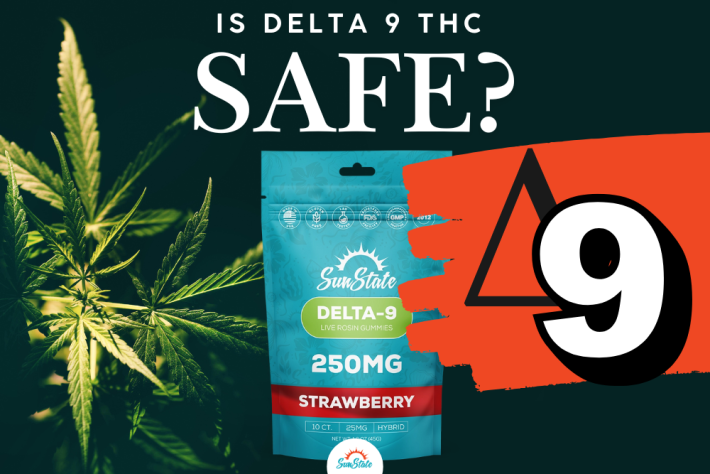In the expanding world of cannabis-derived compounds, Delta 9 THC has emerged as one of the most recognized and discussed cannabinoids. As interest grows around its potential effects—ranging from relaxation and mood elevation to general wellness—many consumers are asking: Is Delta 9 safe? Understanding how it interacts with the body and the factors that influence its impact is key to making informed choices. In this article, we take a closer look at Delta 9 THC—its origins, how it works, and what current science and user reports suggest about its use.
What Is Delta 9 THC?
Delta 9-tetrahydrocannabinol (Delta 9 THC) is one of the naturally occurring compounds found in the cannabis plant. It is known for producing psychoactive effects when consumed, which is often described as a “high.” Delta 9 THC interacts with the body’s endocannabinoid system (ECS), a complex system that helps regulate balance in various bodily processes like mood and appetite.
Delta 9 THC is present in both marijuana and hemp plants, although hemp-derived products legally contain less than 0.3% Delta 9 THC by dry weight. This distinction plays a role in how products are regulated and labeled, especially under the 2018 Farm Bill in the U.S.
How Delta 9 THC Interacts with the Body
Delta 9 THC primarily interacts with CB1 receptors in the brain and central nervous system. This interaction can affect the release of certain neurotransmitters, potentially influencing mood, sensory perception, appetite, and memory. Users often report feelings of euphoria, enhanced sensory awareness, or shifts in perception when consuming Delta 9.
While some consumers associate these effects with relaxation or stress relief, responses vary greatly depending on individual tolerance, dosage, and method of consumption. It’s important to note that experiences are highly subjective and that more research is needed to fully understand the long-term impact of Delta 9 THC on health and cognition.
Common Uses and Consumer Trends
Delta 9 THC products are available in many forms—such as edibles, tinctures, and vaporizers—and are used by consumers for a variety of personal reasons. Some may use it in social settings for relaxation, while others are drawn to it for perceived wellness support. The motivations for use are diverse and depend on personal preferences, product availability, and regional laws.
Consumer feedback suggests that low-to-moderate doses are more likely to produce manageable, desired effects, while higher doses may lead to stronger psychoactive responses or discomfort.
Understanding the Risks and Responsible Use
Like any substance that interacts with the brain, Delta 9 THC is not without potential downsides. Some users report temporary effects such as dry mouth, altered perception, or short-term memory issues. Higher doses may also result in feelings of unease or discomfort, especially for first-time users or those sensitive to cannabinoids.
Frequent or excessive use could lead to increased tolerance or psychological dependence in some individuals. It is advised that consumers start with low amounts and observe how their body responds. Those with personal or family histories of mental health conditions should consult a healthcare provider before using products containing Delta 9 THC.
Legal Considerations
The legality of Delta 9 THC varies widely depending on jurisdiction. In the U.S., hemp-derived Delta 9 THC products containing no more than 0.3% THC by dry weight are federally legal under the 2018 Farm Bill. However, individual states have their own cannabis laws, which may impose additional restrictions on possession, sale, or consumption.
Consumers should always verify local regulations and ensure they are purchasing from reputable sources that provide third-party lab testing to confirm product safety and compliance.
Delta 9 vs. Other Cannabinoids
Delta 9 THC is just one of many cannabinoids, each with distinct effects. Cannabidiol (CBD), for instance, is non-psychoactive and is often used for general wellness purposes. Delta 8 THC is a close chemical relative of Delta 9, reported by some users to offer similar effects with reduced intensity.
Understanding how various cannabinoids interact—and how they may complement each other through what’s known as the “entourage effect”—can help consumers make informed decisions about product selection and personal preferences.
Personal Experiences and Perspectives
User reports and consumer reviews highlight a wide range of experiences with Delta 9 THC. Some users describe a sense of calm, heightened creativity, or improved mood after consumption, while others mention side effects like increased heart rate or temporary confusion.
Because responses can vary widely based on individual biology, setting, and dosage, it’s important to approach any new product mindfully. First-time users may benefit from starting with low doses and choosing familiar, controlled environments for initial use.
Expert Perspectives
Many health professionals recognize the need for more research on cannabinoids like Delta 9 THC. While early findings show potential areas of interest, definitive conclusions about long-term safety, benefits, or risks cannot yet be made. Some practitioners advise that cannabinoid use be discussed with a qualified healthcare provider, particularly for individuals with pre-existing conditions or those taking other medications.
Scientific inquiry into the mechanisms and applications of cannabinoids is ongoing, and regulatory bodies like the FDA continue to monitor new developments.
Conclusion: Staying Informed and Safe
Delta 9 THC is a complex compound with a range of effects that can vary greatly between individuals. While many consumers report enjoyable or beneficial experiences, it’s important to understand both the legal and physiological factors before incorporating it into a wellness routine.
By staying informed, purchasing from transparent brands, and starting slowly, consumers can explore cannabinoids like Delta 9 with greater confidence. As always, consulting a healthcare provider is a smart step when navigating new products that may impact your body and mind.
Legal Disclaimer
*The content provided on this blog is for informational purposes only and should not be considered medical advice.
*The statements made about CBD products have not been evaluated by the U.S. Food and Drug Administration (FDA).
*These products are not intended to diagnose, treat, cure, or prevent any disease or medical condition.
*Always use products as directed on their labels. If you are pregnant, nursing, or have a medical condition, consult with a licensed healthcare professional before using any hemp-derived products.
*Products mentioned on this site contain no more than 0.3% Δ9THC in compliance with federal law.
*These products are not for use or sale to individuals under the age of 18 or 21, depending on the legal age in your state or territory.
*The sale and use of these products may be restricted in certain jurisdictions, and it is your responsibility to comply with all local laws and regulations.
*Always consult with a healthcare provider before introducing new supplements or wellness products into your routine.
*By accessing this site, you agree to abide by the Privacy Policy and Terms & Conditions provided


